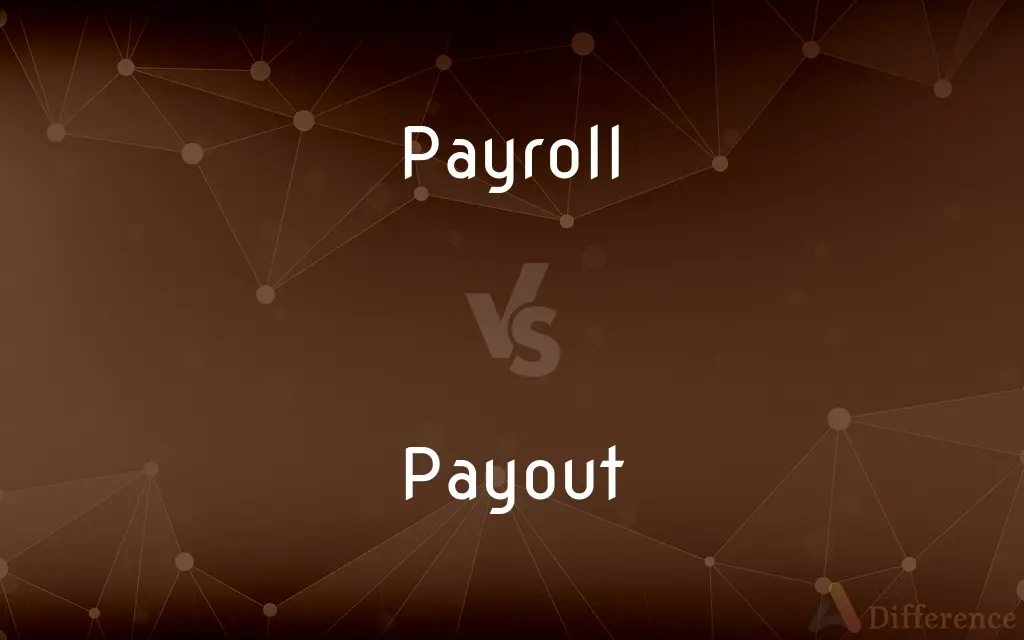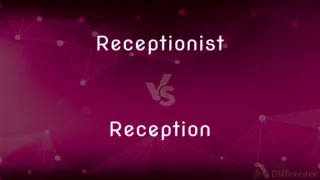Payroll vs. Payout — What's the Difference?
By Fiza Rafique & Urooj Arif — Updated on March 18, 2024
Payroll involves the process of managing employee wages, taxes, and records, focusing on regular payments, while a payout is a one-time or occasional distribution of funds, often to stakeholders or as a reward.

Difference Between Payroll and Payout
Table of Contents
ADVERTISEMENT
Key Differences
Payroll is a comprehensive system that companies use to manage all aspects related to paying their employees, including calculating wages, withholding taxes, and maintaining payment records. It is a recurring process that ensures employees receive their salaries or wages at regular intervals. On the other hand, a payout refers to the act of distributing funds to individuals or entities, which can be a one-time event or occur on an irregular basis. Payouts are often associated with dividends to shareholders, winnings, or settlements.
While payroll is an essential function within the human resources department of an organization, focusing on employee compensation and legal compliance, payouts can be managed by various departments depending on the nature of the distribution. For example, financial departments often handle shareholder dividends, whereas human resources may manage bonuses or rewards.
The calculation involved in payroll includes deductions for taxes, benefits, and other withholdings, tailored to each employee's salary and applicable tax laws. In contrast, payouts such as dividends or bonuses are usually calculated based on company profits, shares held, or specific achievements, without the detailed individual deductions seen in payroll.
Payroll systems often require specialized software to manage the complexity and ensure compliance with employment and tax laws, highlighting the need for accuracy and regularity. Payouts, however, might use simpler processes or one-time transactions, not necessarily needing the same level of software support.
Payroll processes are governed by strict legal standards and regulations to protect both the employer and employee, including timely payment and accurate tax withholding. Payouts, while they may also be regulated, often have more flexibility and are subject to different sets of rules, such as tax treatment of dividends or bonuses.
ADVERTISEMENT
Comparison Chart
Definition
Regular payment to employees for their services.
Distribution of funds on an occasional basis.
Frequency
Regular and scheduled (e.g., weekly, biweekly).
One-time or irregular.
Calculation
Based on hours worked, salary, taxes, and benefits.
Based on profits, shares, achievements, or claims.
Compliance
Strict employment and tax law adherence required.
Subject to various regulations, often less stringent.
Software
Requires specialized payroll systems.
May use simpler processes or general payment systems.
Compare with Definitions
Payroll
The payroll department is responsible for ensuring employees are paid accurately and on time.
The payroll department processed all year-end bonuses yesterday.
Payout
A payout is a significant amount of money paid to someone.
The insurance payout helped rebuild the damaged property.
Payroll
Payroll is the total amount of wages a company pays to its employees.
The company's payroll increased after hiring more staff.
Payout
Payouts can be dividends paid to shareholders of a company.
This quarter's dividend payout was higher than last year's.
Payroll
Payroll systems manage the calculation, distribution, and record-keeping of employee pay.
They upgraded their payroll system to improve efficiency.
Payout
Companies may offer payouts as bonuses or incentives.
She received a generous payout for exceeding her sales targets.
Payroll
Payroll accounting involves recording the compensation of employees.
Payroll accounting is crucial for financial reporting and compliance.
Payout
Settlement payouts resolve disputes or claims.
The settlement payout compensated for the product's failure.
Payroll
Payroll includes deductions for taxes, insurance, and retirement benefits.
Her net income, after payroll deductions, supports her family comfortably.
Payout
A payout may refer to the distribution of a prize or winnings.
The lottery payout was split among three winners.
Payroll
In treasury management, a payroll is the list of employees of some company that is entitled to receive payments as well as other work benefits and the amounts that each should receive. Along with the amounts that each employee should receive for time worked or tasks performed, payroll can also refer to a company's records of payments that were previously made to employees, including salaries and wages, bonuses, and withheld taxes, or the company's department that deals with compensation.
Payout
The act or an instance of paying out.
Payroll
A list of a company's employees and the amount of money they are to be paid
There are just three employees on the payroll
Payout
A percentage of corporate earnings that is paid as dividends to shareholders.
Payroll
A list of employees receiving wages or salaries, with the amounts due to each.
Payout
An amount of money paid out.
The maximum payout from this fruit machine is £20.
Payroll
The total sum of money to be paid out to employees at a given time.
Payout
The value of dividends paid to shareholders.
Payroll
A list of employees who receive salary or wages, together with the amounts due to each.
Payroll
The total sum of money paid to employees.
Payroll
(accounting) The calculation of salaries and wages and the deduction of taxes etc.; the department in a company responsible for this.
Payroll
(euphemistic) Bribes paid to people.
Payroll
(transitive) To place on a payroll.
Payroll
A list of employees and their salaries;
The company had a long payroll
Payroll
The total amount of money paid in wages;
The company had a large payroll
Payroll
The department that determines the amounts of wage or salary due to each employee
Common Curiosities
What are the components of payroll?
Payroll components include gross wages, tax withholdings, benefits deductions, and net pay.
What is payroll?
Payroll is the process of managing the payment of wages by a company to its employees, including the calculation of net pay and the withholding of taxes and other deductions.
Can payouts include bonuses for employees?
Yes, payouts can include bonuses or incentives given to employees, usually as a one-time payment.
Do payroll and payouts require different software?
Generally, payroll requires specialized software due to its complexity and regulatory requirements, whereas payouts might be processed with simpler financial tools.
Can a payout be mandatory?
Some payouts, like certain dividends or legally mandated settlements, can be mandatory.
What is a payout?
A payout is the act of distributing money to individuals or entities, which can be a one-time event or occur irregularly, such as dividends or bonuses.
How does payroll differ from payouts?
Payroll is a regular, scheduled payment process focusing on employee compensation, while payouts are occasional distributions of funds not tied to regular employee compensation.
What regulations affect payroll?
Payroll is subject to employment and tax laws, ensuring fair labor practices and accurate tax collection.
What types of companies need a payroll system?
Any company with employees requires a payroll system to manage wages and comply with legal requirements.
Are dividends considered payouts?
Yes, dividends are a type of payout distributed to shareholders based on company profits.
Is payroll only applicable to employees?
Yes, payroll specifically refers to payments made to employees for their services.
How are bonuses calculated for payouts?
Bonuses may be calculated based on individual performance, company profits, or predetermined criteria.
What is the importance of accurate payroll management?
Accurate payroll management ensures legal compliance, employee satisfaction, and effective financial planning for businesses.
How are taxes handled for payroll and payouts?
Payroll taxes are withheld by employers, while taxes on payouts depend on the nature of the payout and may be paid by the recipient.
Can payouts be automated?
Payouts, like dividends or bonuses, can often be automated through financial systems or software.
Share Your Discovery

Previous Comparison
Receptionist vs. Reception
Next Comparison
Concertato vs. RipienoAuthor Spotlight
Written by
Fiza RafiqueFiza Rafique is a skilled content writer at AskDifference.com, where she meticulously refines and enhances written pieces. Drawing from her vast editorial expertise, Fiza ensures clarity, accuracy, and precision in every article. Passionate about language, she continually seeks to elevate the quality of content for readers worldwide.
Co-written by
Urooj ArifUrooj is a skilled content writer at Ask Difference, known for her exceptional ability to simplify complex topics into engaging and informative content. With a passion for research and a flair for clear, concise writing, she consistently delivers articles that resonate with our diverse audience.
















































